Outstanding young face's project tackles hunger to empower ethnic children
Ngoc Mai -
(VOVWORLD) - 4,000 mountain children have received 2 million free meals through a project called “Moc Chau Child-Rearing” started by Lieutenant Duong Hai Anh of Son La province’s public security force. Hai Anh was honored as one of the 10 Outstanding Young Faces of Vietnam in 2022.
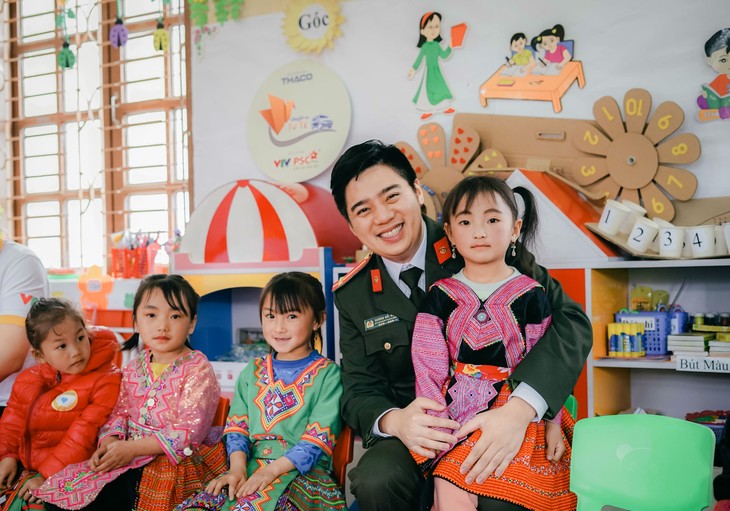 Lieutenant Duong Hai Anh, founder of the "Moc Chau Child-Rearing" charity project. Lieutenant Duong Hai Anh, founder of the "Moc Chau Child-Rearing" charity project. |
Long Sap border commune in Moc Chau district, Son La province, was once infamous as a “dark hub” of drug activity. After graduating from the People’s Police Academy in 2019, Lieutenant Duong Hai Anh set out to transform the lives of local children and eliminate drug activity in Long Sap.
Hai Anh, undeterred by gunfire and other life-threatening dangers, could not resist doing something when he saw the children going to school with only some steamed rice and water. Some only had a few bamboo shoots. In some households, the parents were unable to take care of their children and the children, when not in school, had to forage for food in the forest in order to survive.
"I can’t forget the time I arrested a man whose family was in dire straits. His wife had cancer, his kids couldn't afford to attend school, and he didn't have the qualifications to get a stable job. He was caught transporting drugs for a 20-USD fee, too small an amount to qualify for the death penalty. That experience prompted me to create ‘Moc Chau Child-Rearing’ because I realized that education is a powerful tool to fight against any evil in society. We can't change the past, but we can take action to change the future," said Hai Anh.
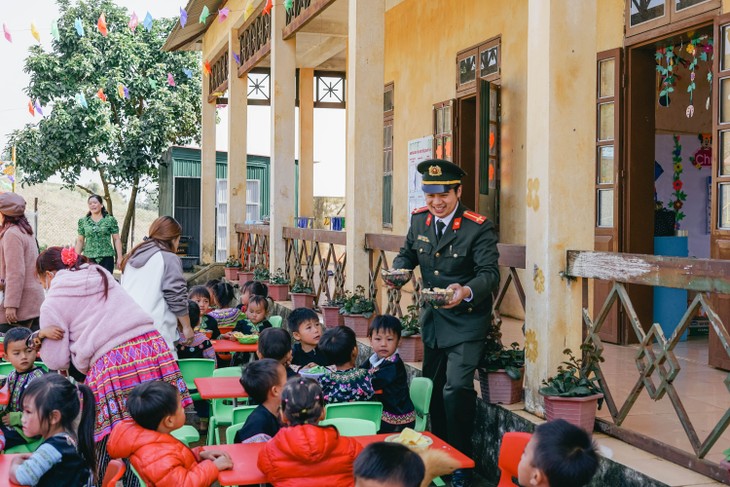 Hai Anh’s project goes beyond a one-time donation to create a long-term, intimate connection between the sponsor and the sponsored child. Hai Anh’s project goes beyond a one-time donation to create a long-term, intimate connection between the sponsor and the sponsored child. |
The majority of people living in Long Sap commune belong to ethnic minorities and suffer from slow economic development. Without life’s basic necessities, it was almost impossible for the children to complete their education.
To address the issue, Hai Anh conducted research on successful volunteer projects both in Vietnam and abroad, and eventually developed his own sustainable model.
"Only by helping children get an education, and become productive members of society can we keep them away from social vices, and help them lead their family out of poverty," said Hai Anh.
"Prior to every school year, we work with relevant agencies to identify children who need support and calculate the cost of the meals they will need for the school year. Our calculations are published online each month to ensure financial transparency. Donors are asked to pay for a whole year to avoid the risk of the program running short of money in the middle of the year.”
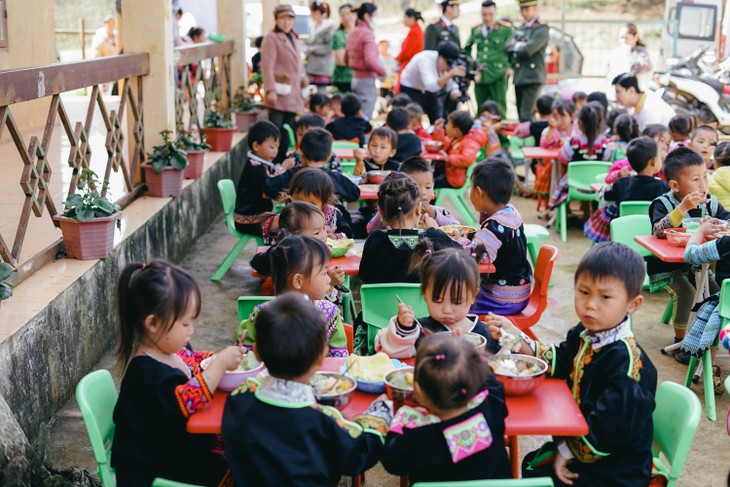 Children enjoy meals provided by the "Moc Chau Child-Rearing" project. Children enjoy meals provided by the "Moc Chau Child-Rearing" project. |
Each child is supported by a single sponsor, but a sponsor can support as many children as they want. Each child has a personal profile online, consisting of their name, age, school, and parents’ and teachers' contact information. These details are given to the donor after they have made their donation.
Hai Anh and his colleagues have leveraged technology to publicize their project.
"We have a chatbot to assist individuals who want to join our initiative. The chatbot walks them through all required steps and verifies the amount of money transferred to our account. If everything is correct, the system automatically sends the donor details about the sponsored child and an e-certificate confirming their contribution, including this quote: ‘By sharing this e-certificate, you enable one more child to be raised.’ Thanks to technology, our project has reached thousands of donors. A person living in Ha Noi or Ho Chi Minh City can support a child who lives in Son La province," Hai Anh elaborated.
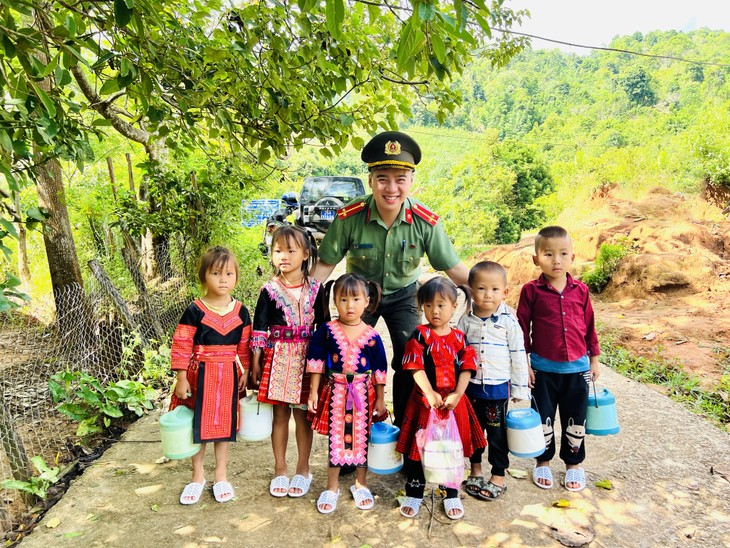 Hai Anh is honored as one of the 10 Outstanding Young Faces of Vietnam in 2022 for his substantial volunteer efforts. Hai Anh is honored as one of the 10 Outstanding Young Faces of Vietnam in 2022 for his substantial volunteer efforts. |
Hai Anh’s project went beyond a one-time donation to create a long-term, intimate connection between the sponsor and the sponsored child.
The supporters are not just donors, but almost like adopted parents of the children they support. At least once a month, the teacher must send each sponsor photos of their child to keep them in touch. Since contact information is available, sponsors can write to or check on their child at any time. This engages the donor in the process of nurturing the child, said Hai Anh.
“It was heartwarming to hear sponsors say they want to provide support until the child is 18 years old and can work on their own. This reinforces my hope that these ethnic minority children will have their material and emotional needs looked after long-term," said Hai Anh.
The enormous workload of maintaining and expanding the “Moc Chau Child-Rearing” project sometimes causes Hai Anh to run out of energy and struggle to balance his career and his volunteer efforts.
"I underwent a process of learning from my mistakes in order to develop my project. At first I did everything myself, creating the website, synchronizing the ID photos, refining the website and teaching these skills to my colleagues. This is an unpaid activity. Volunteers often help us for a few months and then leave to focus on their own work, which is understandable. But as the leader, I couldn’t give up. So I came up with the idea of creating an e-handbook that includes all the necessary information to perform each role in the project, making it easier for people to take part in, and easier to expand the project," he said.
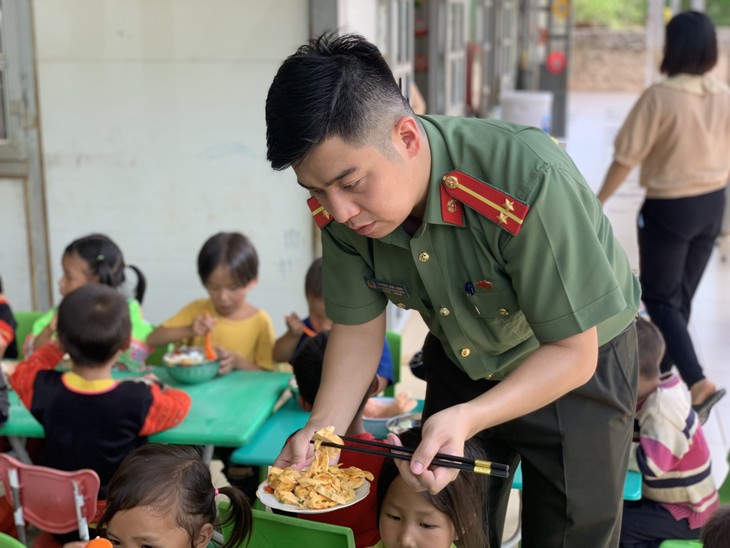 Hai Anh's project enhances the ethnic children’s living standard and strengthens his bond with the local community. Hai Anh's project enhances the ethnic children’s living standard and strengthens his bond with the local community. |
Against all odds, Hai Anh’s efforts to help thousands of children have never ceased. Another project he started, “Happiness for children,” has constructed homes for families in dire need, and upgraded wooden classrooms to more solid facilities.
"We discovered that the children lacked, not just food, but other things, like clean water, warm clothes, and blankets. So we created auxiliary programs called ‘Warm Clothes to School,’ ‘Warm Blankets at School,’ and ‘UNICEF Filtered Water’ to provide the children with warm clothing, bedding, and clean drinking water. In addition to material support, we also support the children’s emotional development through projects like ‘Old Toy Cabinet’ and ‘Old Book Cabinet,’ which transfers toys and books from urban children to children in the highlands."
Lo Thi Loi, a beneficiary, said, "It was a pleasure and happiness for our family to receive a new house from Lieutenant Hai Anh’s project."
After a while, Hai Anh realized that his project had not only enhanced the ethnic children’s living standard, but had strengthened his bond with the local community, which bolstered his role as a police officer.
"I used to come here just to arrest criminals. Now I also come to engage with local people, listen to their wishes, and promote the law. It was unexpected how much my initiatives would help local officials manage social order and disseminate state regulations to the ethnic minorities. As people's awareness grew and positive values spread, the crime rate dropped dramatically. The public are much more cooperative with local authorities and regard us as their friends, because they appreciate our efforts to secure a better future for their children," said Hai Anh.
 Hai Anh and his colleagues. Hai Anh and his colleagues. |
In two years of operation, Hai Anh’s initiative has received more than half a million USD and helped over 4,000 children in three districts of Son La province including Van Ho, Moc Chau, and Bac Yen, earning Hai Anh the National Volunteer Award in 2021, and the Prime Minister’s certificate of merit.
"We’re calling for donations to expand this project, and organizing a program to bring donors to Son La to meet the children they have been sponsoring. This will allow people to see that the stories are genuine, and that they are making a real difference in the lives of these children. By personally connecting with the kids, the donors will see the impact of their support and how it is helping to nurture a better life for these children. We’re also finding jobs for the children’s parents to create a more solid foundation for the kids."
Ngoc Mai